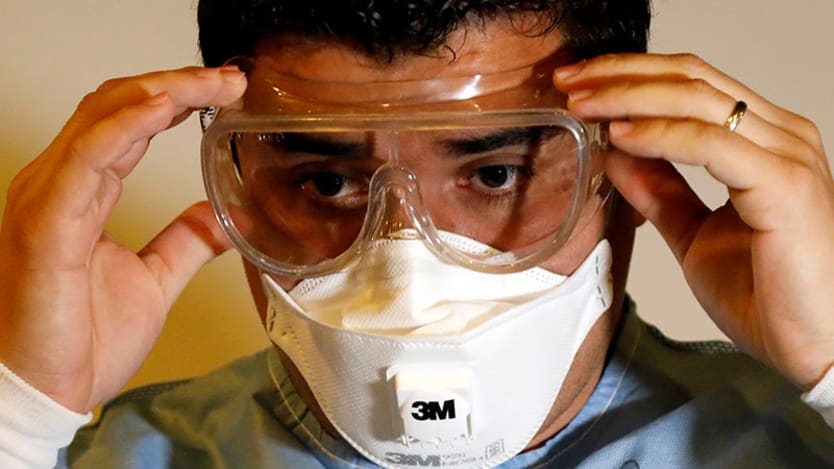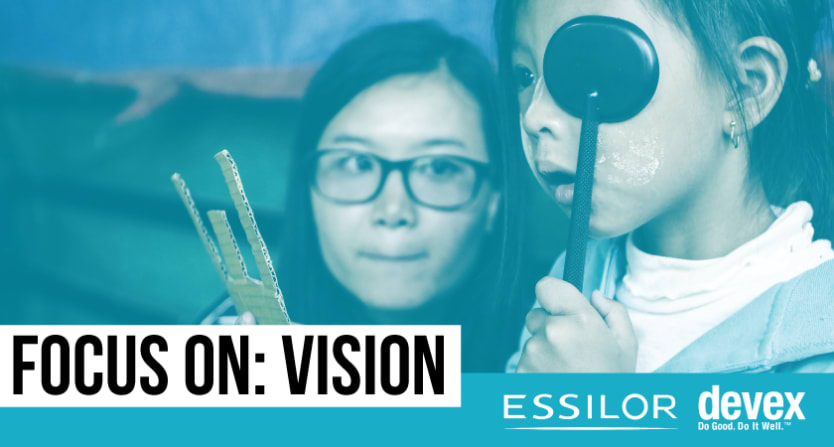
GLASGOW, Scotland — Vision programs across the world have largely been put on hold as a result of lockdowns, restrictions on movement, and concerns for staff safety during the COVID-19 crisis. Outreach activities such as eye screenings and nonemergency surgeries have been suspended, and providers expect a greater demand for these services when normal programming resumes.
The current situation is likely to have a hugely negative impact on eye care and the quality of care in general, said Dr. James Clarke, an ophthalmologist and medical director of Ghana’s Crystal Eye Clinic — which runs in partnership with Unite for Sight — in an email to Devex.
Eye health care workers pivot to COVID-19 response
The new coronavirus has stopped the standard, day-to-day operations of The Fred Hollows Foundation. But health care personnel supported by the Australian vision nonprofit are finding ways to continue their work through COVID-19 prevention and treatment efforts.
“Those who live in remote places, where services are not available and therefore rely heavily on outreach services, are going to be most affected,” Clarke wrote. There is also concern for patients suffering from eye conditions such as glaucoma that, if left untreated, can lead to irreversible damage, he continued. Ensuring that staff can work safely and have access to necessary equipment is an additional challenge for vision organizations at this time.
But the ongoing emergency may also provide opportunities for experts in eye health to provide support and integrate COVID-19 awareness into their future work. Devex finds out how vision programming is being affected by the current pandemic.
Emergency-only services
With elective surgeries and community outreach activities on hold, many organizations are working mainly on providing emergency procedures. Since medical staff are exempt from the lockdown, Clarke’s clinic has also remained open for limited services, such as eye-pressure checks, post-surgery care, and dispensing medication. However, it is difficult for people to leave the house and reach the clinic, he said, so many post-surgery patients are seeking advice through local volunteers or phone consultations.
Similarly, the charity Sightsavers has suspended all outreach activities and elective surgeries, which primarily deal with cataracts. The aim is to reduce the risk of exposure for both patients and health care workers, said Imran Khan, the organization’s chief global technical lead. “We are still able to treat and operate in emergency situations where there is a threat to vision,” he added.
VisionSpring, an India-based organization that provides eye screenings and dispatches eyeglasses, has also had to suspend most of its work. According to Anshu Taneja, VisionSpring’s country director for India, the organization is working with the government in some states to distribute glasses that were already ordered and waiting to be shipped. And, like other organizations in this space, it is looking for ways to contribute to emergency response efforts through logistical support and hygiene knowledge.
Opportunities to share expertise
India’s countrywide lock down halted VisionSpring’s work almost overnight, so the organization had to consider how it could move forward and be most useful to society during this time, Taneja said. “We had the network, we had the supply chain strength, we had the field strength who could reach the remotest parts of the country,” he said, so it made sense to pivot to emergency support.
“We felt our strengths and core competencies — that, for the foreseeable future, may not be used for eye care and eye screening — can be used … for the work on COVID response,” he said.
“More time will be needed for health education on the coronavirus, personal hygiene, and protective measures in local dialects — in addition to the routine eye health education.”
— Dr. James Clarke, medical director, Crystal Eye ClinicFocusing on India, Bangladesh, and five countries in sub-Saharan Africa, the organization is now working to procure personal protective equipment, or PPE, for health workers and masks for wider distribution. It is also setting up hand-washing stations and providing community education on the pandemic. The team of 250 people was quickly brought up to speed on the World Health Organization’s COVID-19 training and guidelines. Other training looked at procurement, Taneja said, and a survey of over 100 hospitals helped to identify their immediate needs.
Meanwhile, Sightsavers is leveraging its expertise in community education to highlight the importance of hygiene. “Some of the work that we’re doing is using NCD [noncommunicable disease] platforms to really spread some of that social behavioral change around hand-washing,” Khan said. Messaging on the prevention of trachoma, for example, has been adapted to the COVID-19 response. Providing information and resources to partners aims to ensure that the response is inclusive for people with disabilities, he added.
According to Khan, the Ebola crisis in West Africa can provide lessons for the current response. Elective surgeries and activities that involved mass gatherings were similarly suspended during that crisis. But back then, the organization was more reactive regarding services and ensuring access to protective equipment, Khan said. “With COVID-19, we’ve been much more proactive ... in terms of our response as well as ensuring that health workers are kept safe,” he added.
Staff safety and procurement challenges
As organizations try to maintain at least some of their services, staff safety is a big priority. Before Ghana’s lockdown, which applied to just two major cities, outreach activities that were mainly conducted in hard-to-reach areas continued with no additional safety measures in place, Clarke said. But as knowledge of the coronavirus grew, safety measures were quickly introduced and staff on the outreach team were provided with masks and gloves for their screening work, he said. The nationwide ban on public gatherings meant that these activities were eventually put on hold, but medical staffers still working in clinics are provided with all the necessary PPE, and social distancing is practiced in waiting areas.
At VisionSpring, mechanisms have been put in place to monitor the safety and symptoms of the organization’s large team. Before leaving the house each morning and after returning in the evening, staff members complete a basic risk assessment and report any symptoms they are experiencing, Taneja said. In addition to PPE, the organization has deployed its own vans, which are sanitized twice daily, to pick up and drop off workers. Insurance coverage, sick leave, and per diems have all been increased to provide additional support. Joining the response was also completely voluntary for staff, Taneja stressed, but the majority of the team has been enthusiastic to do so.
While there is a shortage of some medical commodities, access to equipment and medical supplies in general is not currently an issue for the organizations Devex spoke with. Pharmacies remain open, couriers continue to deliver essential items, and existing connections within the health sector’s supply chain can also help organizations quickly get the necessary governmental permissions to build stock of PPE.
However, accessing such items might become more challenging in the coming months, and personnel and spare parts may not be available to maintain equipment. “There’s quite a long lead time that we procure these in … and with a lot of the activities paused, we don’t need a lot of that equipment immediately,” Khan said. But when normal work resumes, there may be issues in getting supplies for newer programs where orders were not placed before the current crisis.
Post-coronavirus programming
Taneja noted that the ongoing pandemic will shift how eye health services are provided, particularly given the close connection between eyes and the spread of the virus. “I see a change in what we are doing … having those infection-prevention practices as an integral part of the work,” he said.
But he added that this response has created an opportunity to see the different ways that VisionSpring can add value to people’s lives. For example, eye screening camps could be used for activities related to COVID-19 awareness, sanitation, and hygiene education.
There will likely be an immediate and increased demand for eye care services once restrictions are lifted; Clarke anticipates a “massive turnout” at outreach centers, which will require staff to double their workload and spend extra time in communities.
“More time will be needed for health education on the coronavirus, personal hygiene, and protective measures in local dialects — in addition to the routine eye health education,” he wrote. Rolling out these activities quickly and addressing the anticipated backlog of cataract surgeries will require additional funding, too.
Predicting the overall impact of the current crisis is difficult, but Khan said that there will likely be an increased demand for strengthened health systems equipped to respond to the needs of the population in any emergency. Sightsavers will focus on advocating for this and working with partners, governments, and international aid agencies to build more resilient health systems.
Devex, with financial support from our partner Essilor, is exploring challenges, solutions, and innovations in eye care and vision. Visit the Focus on: Vision page for more.

Search for articles
Most Read
- 1
- 2
- 3
- 4
- 5








